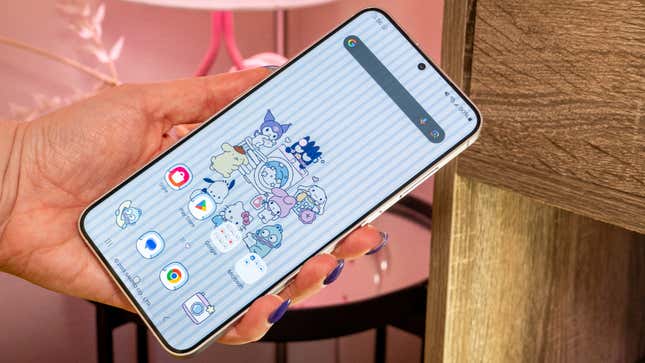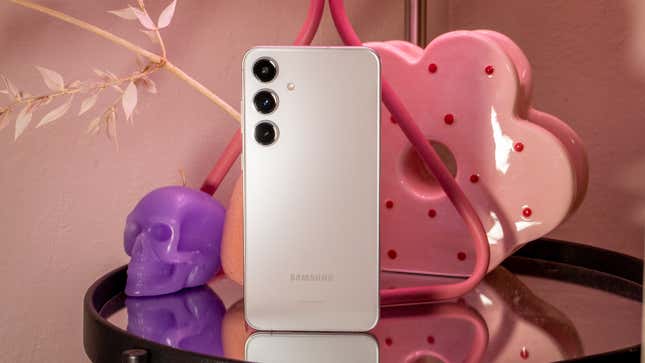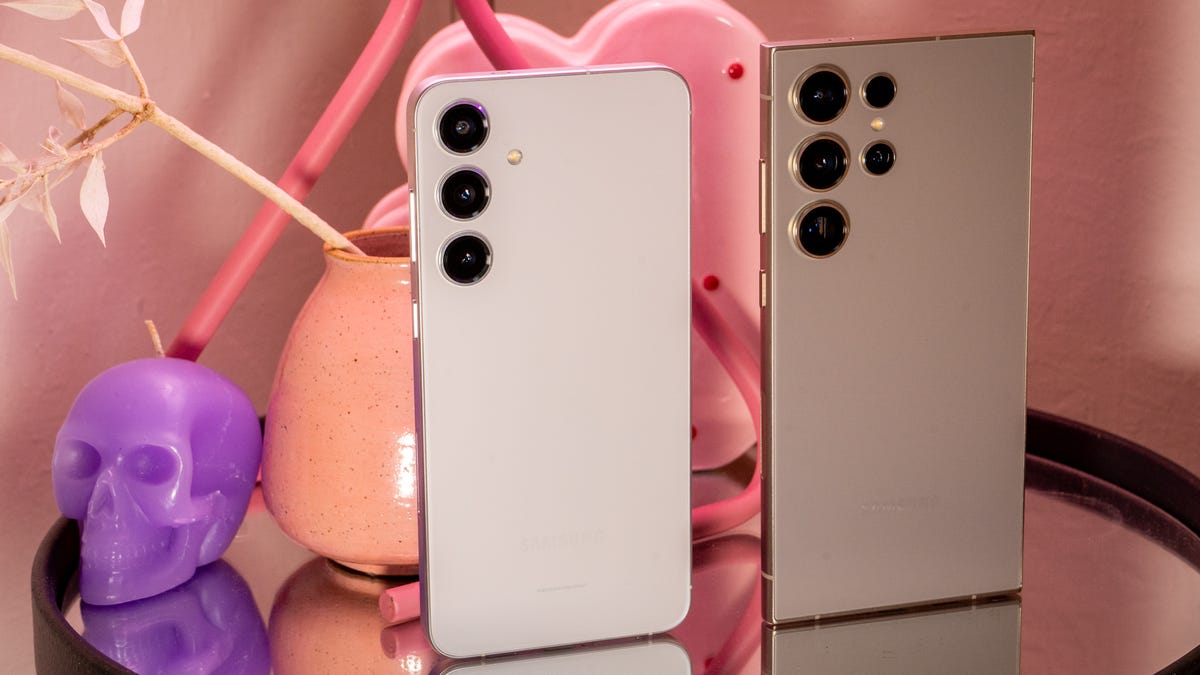Thinking of buying a new Samsung smartphone but don’t want to shell out the cash for the Galaxy S24 Ultra? You don’t have to pay for all the extra stuff Samsung’s gargantuan phone offers, like the additional telephoto lens, titanium chassis, and docked stylus. Consider the Galaxy S24+ instead, which boasts most of what the Ultra can do and starts at $300 less than the S24 Ultra.
You might also keep reading if you rely on whatever smartphone upgrade your carrier will give you with a discount. I’ve noticed an uptick in TV advertisements offering the Samsung Galaxy S24+ as a freebie for signing on with a mobile network. If those ads feel targeted to you, read about the kind of smartphone you’re getting into.
Galaxy S24+ vs. Galaxy S24 Ultra
Design
The Galaxy S24+ would technically be a “big phone,” but it’s smaller than the Galaxy S24 Ultra. As far as dimensions go, it’s about the size of the Google Pixel 8 Pro—big enough for some folks, but the rounded edges and slightly thinner chassis make it so it’s not sticking out of your pants pocket.
The more discernible difference between the Ultra and the Plus is in the relative heft of each device; the Galaxy S24 Ultra is nearly two ounces heavier than the Galaxy S24+. However, I like the density of the Ultra versus the lightness of the S24+ because it makes it easier to balance on your palm as you’re typing two-handed. There’s more fear of dropping the phone with the Galaxy S24+.
The Galaxy S24+ doesn’t feature the fancy titanium build like the Ultra. The available colors are yellow, violet, gray, and black. They’re more colorful than the Ultra variants, almost like swatches rather than a tinted finish. Both phones have a matte back, though the Galaxy S24+ is particularly unforgiving to fingerprints. They’re both IP68 rated, which, if you’re shopping for a flagship phone, should always have this level of water and dust resistance.
Display

The Galaxy S24 Ultra is a heck of a smartphone. It has a 6.8-inch AMOLED display, which is not much bigger than the 6.7-inch screen on the Galaxy S24+, though it certainly feels like it when you hold the phone in person. Both the S24 Ultra and S24+ have the exact QHD+ screen resolution, a nice parity if you want the big screen to watch videos on the train ride home.
The only bummer about the Galaxy S24+ is that choosing it means you’ll miss out on the Ultra’s semi-matter display panel. Then again, if you think you’d miss staring at your reflection, the Galaxy S24+ is it. It has a shiny screen. I’m looking at myself in it right now.
Performance
Samsung is typically on the mark with its marquee devices, especially in terms of performance. After all, this is the lineup that’s supposed to compete for iPhone users. The Galaxy S24+ and its brethren in the series boast Qualcomm’s Snapdragon 8 Gen 3 processor. It’s paired with 12GB of RAM on both the S24+ and the Ultra- again, there is some excellent feature parity between the two “big” models, which we didn’t see in the last few generations of the Galaxy flagships. A quick run through the benchmarking suite, Geekbench 6, shows similar performance numbers between the S24+ and S24 Ultra, which bodes well for longevity.
Now for the flipside: if you’re looking for 1TB of storage on the go, the Galaxy S24+ won’t do. The smartphone is only available in 256GB and 512GB storage options. These phones don’t have microSD slots, so what you buy is what you get.
Battery
So far, the battery life on the Galaxy S24+’s 4,900 mAh pack has been on par with the Galaxy S24 Ultra’s 5,000 mAh pack. This year’s Ultra can finally keep up with Apple’s iPhone 15 Pro Max in terms of longevity. I will update you with the full battery rundown soon, though I expect the Plus to be only an hour behind the Ultra.
Wired charging speeds are essential, even when you’re not watching the clock. The Galaxy S24+ offers 45W charging, just like the Ultra, though you’ll need to grab that particular capacity of a power brick if you want to replenish at full speed.
Camera
This is where you will see the difference between the Galaxy S24+ and the Ultra. For starters, the Galaxy S24+ has a triple rear-camera system consisting of a 50-MP primary camera with f/1.8 aperture and OIS, a secondary 12-MP ultra-wide camera with f/2.2 aperture, and a tertiary 10-MP telephoto camera that tops out at 3x optical zoom.
If you want to zoom in further, it’s only happening with the Galaxy S24 Ultra. Samsung’s ultimate device has an extra telephoto lens, plus up to 5x optical zoom on its secondary 50-MP camera sensor. Its primary camera is a 200-MP sensor. The Ultra offers a sharper low-light photo compared to the Galaxy S24+.
Video recording capabilities remain the same across the board: both the Galaxy S24+ and Galaxy S24 Ultra record in 8K resolution up to 30 frames-per-second (fps). They both offer the ability to stabilize video at lower resolutions. And they both have the nifty AI-enhanced ability called Instant Slow-mo, which lets you add a slow-motion effect to a video after the fact. The offering is part of Samsung’s Galaxy AI suite of wonders.
Software
There’s no Sophie’s Choice between the Galaxy S24+ or Galaxy s24 Ultra—especially not regarding AI offerings. Both devices run Android 14 with Samsung’s One UI 6.1 overlaid on top—the software update just hit some older Galaxy devices, too.
Galaxy AI is thoroughly infused in the Galaxy S24+. It has Circle to Search, just like the Ultra and the previously mentioned Instant Slow-mo. It also carries the same software update promise as the rest of the Galaxy family: up to seven years of operating system and security updates.
Should you buy the Galaxy S24+?

If you like what you just read, you have my permission to make that leap. The upside of the Samsung Galaxy s24+ is that it doesn’t require you to tote around a stylus you may or may not use, so you don’t need to carry a device making room to accommodate that. Also, titanium is not a reason to choose one phone over the other, so you don’t have to worry about factoring that in. The Ultra is a better get if you like to zoom in from afar and are a stickler for sharing a sharp shot on social media.

